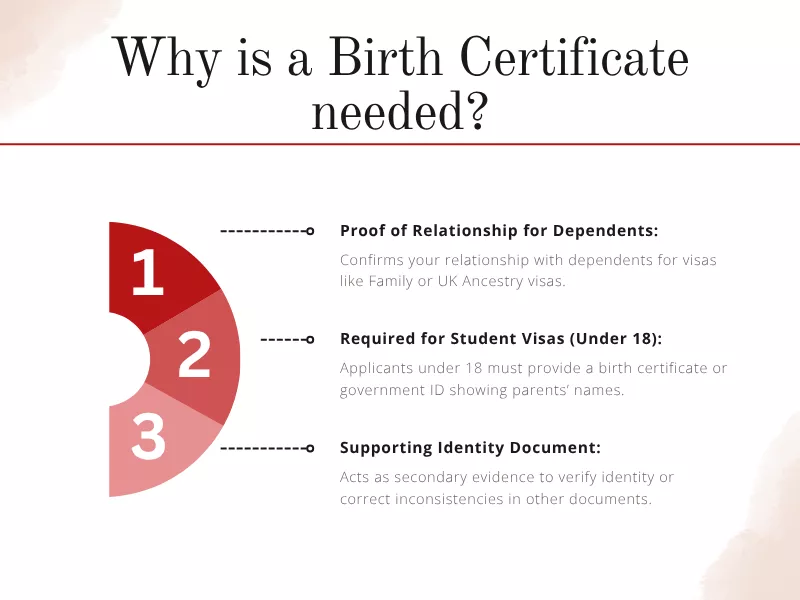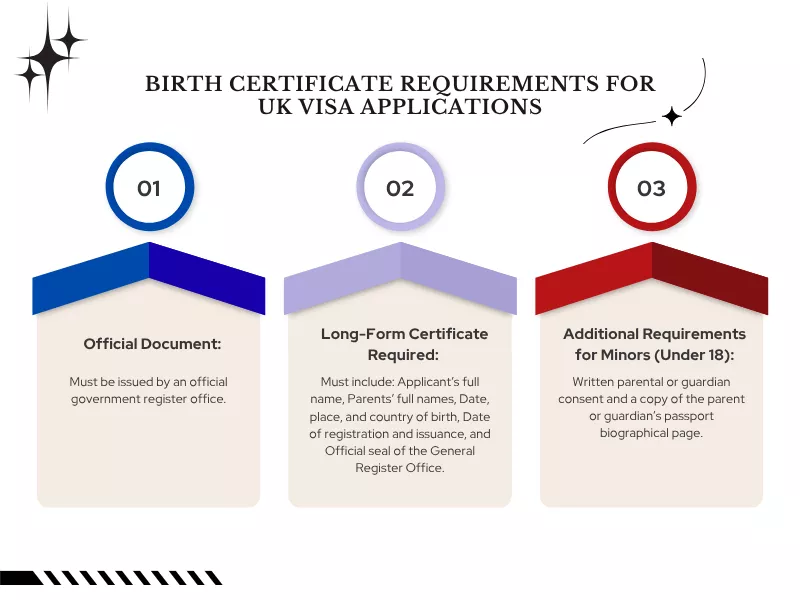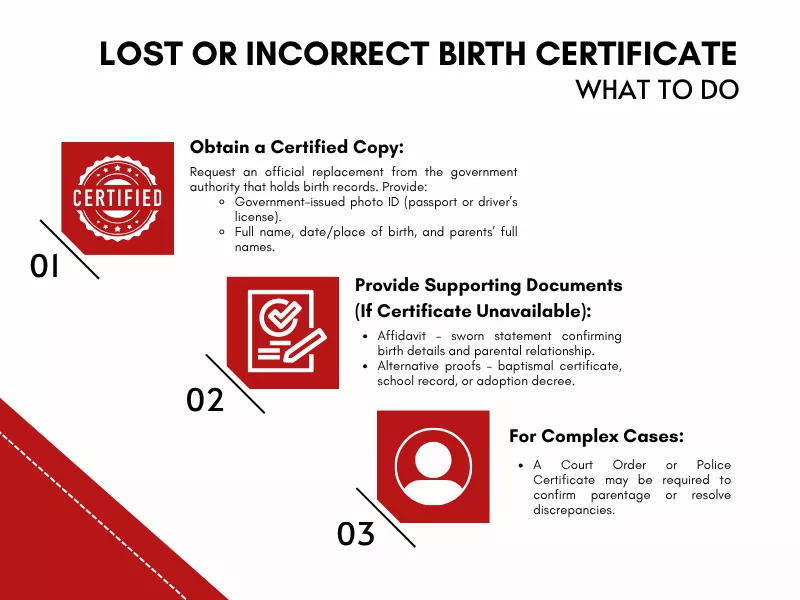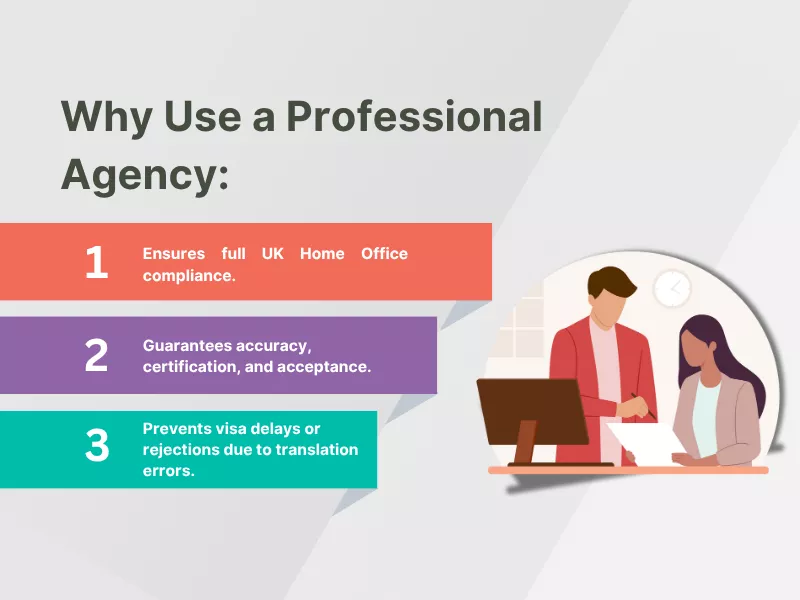Are you relocating to the UK for business, education, or personal reasons? Then, one of the major requirements for the visa application is submitting your original birth certificate. In this article, we will discuss this requirement in detail. Apart from this, you will know what to do in case you do not have the original certificate and what the alternative options are. For birth certificates issued in different languages, we will explain the translation requirements as well. Keep reading to know everything to ensure a smooth immigration process.
Why Do You Need a Birth Certificate for a UK Visa Application?

A birth certificate is required for a UK visa application to confirm the identity, age, nationality, and familial relationships, especially when family members are involved. Here are the main reasons why you need the certificate:
1. To Prove Your Relationship with Dependents for Citizenship
If you are applying for a visa with dependents, a birth certificate is essential to prove your relationship. The Home Office uses this to verify that the dependent is genuinely related to you. This verification is important to prevent fraudulent applications and maintain the integrity of the visa process.
This requirement applies to certain visa categories:
- Family Visas: Used to confirm your relationship with a family member (e.g. spouse, children, etc.) in the UK.
- UK Ancestry Visas: Applicants must provide their own birth certificate as well as those of their parents and grandparents to prove ancestry.
2. Student Visas
If you are under 18 years old, you must provide your birth certificate or another government-issued document showing your parents’ names.
3. As a Supporting Document
Even if you are applying for a different Visa path apart from the above-mentioned ones, a birth certificate may still be required for certain cases. For example, it serves as secondary evidence to confirm your identity or clarify personal details, especially if there are discrepancies in other submitted documents.
What Are the Birth Certificate Requirements for Visa Application Process?

For document verification for immigration, the UK Home Office has specific requirements for the type of birth certificate and the information it must contain.
- Official Document: The birth certificate must be an official document issued by an official register office of the country’s state.
- Long Form Certificate: The “long-form” or “full” version of the birth certificate is required. This version contains more detailed information than the shorter, abridged version. The long-form birth certificate format for embassy use typically includes:
- The applicant’s full name
- Full names of both parents
- Date of birth
- Place of birth
- Country of birth
- Parents’ full names
- The date of birth registration.
- The issuance date of the certificate
- The official seal of the General Register Office.
- Specific Requirements for Minor Applicants: In addition to a birth certificate, applicants under 18 must provide:
- Parental Consent: Written consent from both parents or legal guardians (or one parent if they have sole responsibility).
- Copy of Parent’s Passport: A copy of the biographical page of the parent’s or legal guardian’s passport.
It is crucial to check the specific requirements for the visa you are applying for, as the required documents can vary. Always refer to the official UK government website for the most up-to-date guidance.
What Should I Do If My Birth Certificate Is Lost or Has Errors?

In certain cases, applicants do not have access to the original certificate because they have either lost it or damaged it. Sometimes, the original one also contains errors. In this case, you have two options:
Option 1: Need to Obtain a Certified Copy of the Birth Certificate
The birth certificate application process varies by country, but all processes are built around two key requirements: proving your identity and providing enough information for the authorities to locate the correct record.
To prove your claim and identity for a new birth certificate application process, you will generally be required to provide:
- Government-Issued Photo Identification: A clear copy of an unexpired document, such as a valid passport or driver’s license. This confirms you are who you say you are.
- Detailed Personal Information: You must provide the exact details of the birth record you are requesting, including:
- Full name at birth
- Date of birth
- City and county/state of birth
- Parents’ full names, including the mother’s maiden name.
For a British Citizen (Born in the UK)
If you were born in the UK, you can order an official copy from the General Register Office (GRO). The process is primarily information-based, and the most common method is applying online through the GOV.UK website. You will be required to provide the detailed personal information listed above. The GRO uses this to match and verify the record before issuing a new certified copy by mail.
For Those Born in the United States
If you were born in the US, you need to apply for a new certified copy from the vital records office in the specific state of your birth. Each state has its own procedures, which can be found on its official department of health website.
To apply for a replacement of a lost birth certificate, the documents required are typically:
- A completed application form.
- A copy of your government-issued photo ID (such as a driver’s license or passport).
- Payment slip for the statutory fee.
For US citizens living abroad, services like VitalChek are often authorised to handle requests for the birth certificate legalisation process. Alternatively, the US Department of State website provides guidance and links to the various state-level offices to assist citizens overseas.
Option 2: Providing Supporting Additional Documents
Certain documents are often accepted in case you are unable to provide the original or a certified copy of a birth certificate. These are:
An Affidavit
This is a sworn statement which presents a written explanation of the applicant’s birth details and confirms the parental relationships. This can be made by you or a person with direct knowledge of your family circumstances. The affidavit must be signed in the presence of a legal authority, such as a solicitor or notary public.
Other Documents
You can also use:
- A baptismal certificate.
- A school record.
- An adoption certificate or decree (for adopted applicants).
Apart from these, official documents from a verifiable and independent source that state your parents’ names may be accepted. Also,
In more complex situations where parentage must be definitively proven, a court order from a family court may be required. This is a formal declaration from a judge that resolves any legal question about your parentage and serves as strong evidence. Some cases also include a police certificate if issued.
Birth Certificate Translation for Immigration

When Is a Translation Required?
The UK Visas and Immigration (UKVI) has a clear rule: any document that is not originally in English or Welsh must be accompanied by a fully certified translation.
Therefore, if your birth certificate is in any other language, such as Spanish, Chinese, or Arabic, you must provide a translation. You will need to submit both the original birth certificate (or a certified copy of it) and its corresponding translation.
Official Requirements for a Certified Translation
The Home Office will not accept self-translated documents or uncertified translations, as they cannot be officially verified. For a translation to be accepted for UK immigration purposes, it mandates a certified translation of the Birth certificate for legal purposes, and it must include:
- Confirmation from the translator or translation company that it is a “true and accurate translation of the original document.”
- The date of the translation.
- The full name, signature, and contact details of the translator or an authorised official of the translation company.
Unlike the requirements of some other countries, there is no need for a notarised birth certificate translation in the UK. Unlike the requirements of some other countries, there is no need for a notarised birth certificate translation in the UK. Understanding the difference between a certified vs notarised translation is important; while a certified translation includes a statement of accuracy from the professional translator, a notarised translation involves a public official witnessing the signing of that statement.
In case you are a UK citizen and migrating to another country which speaks a different language and is a part of the Hague Apostille Convention, you will further need an Apostille for birth certificate translation.
How a Professional Translation Agency Can Help?

Navigating immigration requirements can be stressful, and incorrect or non-compliant translated copies of documents can cause significant issues like visa application delays or even rejections.
Only professional translation services can offer Certified Translation for legal documents.
At Translations.co.uk, we specialise in providing fully certified translations that meet all UK Home Office requirements. Our team of accredited translators ensures that your birth certificate is translated with the highest level of accuracy and is certified correctly, guaranteeing its acceptance by immigration officials.
Whether for original documents or certified copies, we take the guesswork out of the process, providing you with a fast, reliable, and compliant UK translation company so you can proceed with your visa application with confidence.
Conclusion
A birth certificate is a cornerstone of a UK visa application, essential for proving identity and family ties. This guide outlined its importance and the specific requirements for submission. Whether you need to obtain an official certified copy to replace a lost original or secure a certified translation for a non-English document, meticulous preparation is paramount. Understanding these official requirements and addressing them correctly is the key to ensuring your application is strong and your immigration process is as smooth and successful as possible.
Frequently Asked Questions
Can I use a birth certificate issued by an embassy or consulate for UK immigration?
Birth certificates issued by your country’s embassy or consulate are not accepted for UK visa applications. These certificates are typically created using the information in your passport rather than verified birth records. Because the embassy or consulate does not have direct evidence or official records of your birth, such certificates are not considered valid proof of birth by the UK Home Office.
What is a Birth Certificate Affidavit and Do I need this in UK?
An affidavit is typically used only when someone needs to make a formal, sworn statement about a fact, for example, to confirm their name, date of birth, or parental details, in cases where the original birth certificate is unavailable or insufficient. However, a birth certificate affidavit is not a standard document used in the UK. For official purposes, such as applying for a passport, National Insurance number, or benefits, you must provide an official certified copy of your birth certificate, which can be obtained from the register office.
Do I need a Birth Certificate for a Biometric Residence Permit?
In most cases, adult applicants do not need to provide a birth certificate when applying for a UK Biometric Residence Permit (BRP), as it is not a standard requirement.
However, a birth certificate may be required if:
- You are under 18, to prove your relationship to a parent or guardian; or
- You have changed your name and need to provide official evidence of the change.
The exact documentation required can vary depending on your individual circumstances and your country of origin, so it is always best to check the official UK government guidance for your specific application.
Is an apostille or notarisation required for using a birth certificate abroad?
Whether you need an apostille or notarization for your birth certificate depends entirely on the country where you plan to use it.
- Apostille: You will need an apostille if the destination country is a member of the Hague Apostille Convention (this includes over 120 countries, like the US, UK, and most of Europe). An apostille is an official government certificate that authenticates your birth certificate for use in these countries.
- Notarization: Notarisation alone is not sufficient for international use. It is a domestic process that verifies a signature and is usually only a preliminary step before getting an apostille.
- Embassy Legalisation: If the country is not a member of the Hague Convention, you will likely need to go through a more complex process called embassy legalisation.
In short: Always check the requirements of the foreign country. For most international purposes, you will need an apostille.
- What You Should Know about the Importance ofBirth Certificates - 5th February 2026
- What to Do If You’ve Lost Birth Certificate: A Step-by-Step Guide - 12th November 2025
- Birth Certificate for Immigration: A Major Requirement - 31st October 2025












